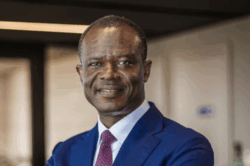By Deborah Asantewaah SARFO
Artificial intelligence (AI) is transforming the accounting profession, but it is not a replacement for accountants. Instead, it is enhancing efficiency, accuracy, and strategic decision-making, according to experts at the ACCA Orbit 2025 summit in Accra.
Themed: :AI and the Future of Work’, the event, organised by ACCA Ghana, brought together finance professionals, industry leaders, and students to examine how AI is changing the nature of work.
Colonel Nobel Carl Doe Dei-Alose, Chairperson of ACCA Ghana, highlighted the growing influence of AI, noting that “we can no longer take it for granted that issues like artificial intelligence do not matter.”
He urged future accountants to prepare for the reality of an AI-driven workplace, warning that those who fail to adapt will be at the losing end. “Anyone who reacts too slowly and is left behind will be crushed in the market and in the employment place.”
The accounting profession has historically been associated with compliance, financial reporting, and auditing. However, AI is automating many of these traditional tasks, allowing professionals to focus on higher-value services such as financial strategy and risk management.
According to Martin Bortey, IT Business Consulting Partner at Ernst & Young, AI is not just automating tasks, it is redefining how accountants operate. He explained that AI is driving process automation by eliminating repetitive tasks such as data entry and reconciliations, enabling accountants to focus on analysis and decision-making.

Machine learning algorithms are improving fraud detection and compliance monitoring beyond traditional methods, while predictive analytics is providing real-time financial modeling, offering businesses deeper strategic insights. AI-driven auditing tools can process large volumes of financial data instantly, improving accuracy and compliance.
Mr. Bortey cited an example from his own firm, where AI is being used in audits. “There are generative AI tools that allow you to literally upload various files in different formats into the tool, and within a very short time frame, it can generate a report for you.
This saves time, it is more efficient, and you can focus your energies on value-creating tasks,” he elaborated. This comes as AI is not just reshaping Ghana’s financial terrain; it is a strategic priority for businesses worldwide.
The global AI market, valued at £190 billion in 2024, is projected to reach £1.5 trillion by 2035, according to Jonathan Lutterodt, Strategy and Business Transformation Partner at KPMG.
Citing a 2024 KPMG global CEO survey, Mr. Lutterodt noted that two-thirds of global chief executives plan to invest in AI, regardless of economic conditions.
In West Africa, 80 percent of CEOs said they do not expect AI to lead to job cuts, while 93 percent anticipate long-term returns on AI investments.
“Your employers see AI as a strategic lever, and they are going to invest in them,” Mr. Lutterodt said. He urged accountants and business professionals to take AI seriously, arguing that it would help drive cost efficiencies.
Skills
With AI reshaping the profession, accountants must acquire new competencies to remain relevant. The speakers outlined key skills for the AI-driven future, including data analytics, digital finance, and strategic advisory expertise.
Mr. Bortey pointed out the importance of human oversight, stating that “AI can process data, but human judgment remains indispensable.” He encouraged accountants to shift their focus to value-adding services such as risk advisory and financial strategy.
Urging attendees to see AI as a tool for progress, he added; “The future of accounting is not about choosing humans and AI. It is about leveraging AI to enhance professional judgment, innovation, and strategic decision-making.”










